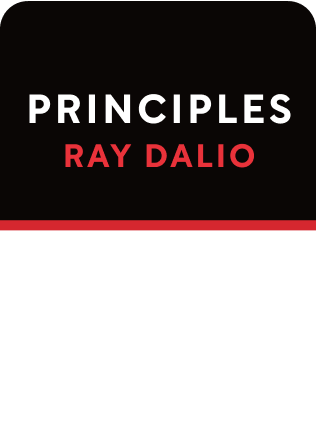

This article is an excerpt from the Shortform summary of "Principles: Life and Work" by Ray Dalio. Shortform has the world's best summaries of books you should be reading.
Like this article? Sign up for a free trial here .
What are the principles for success? Are there principles of success you should stick with for both work and life?
Ray Dalio’s principles for success can apply to both life and work. While the core principles help you follow a five step process to achieving your goals, there are additional principles that can help you get there.
Read more about the principles for success.
Principles for Success: Ray Dalio’s Tools
In the Principles for Success, Ray Dalio says: Don’t let yourself get extorted. Ignore threats about harmful actions taken, such as quitting, bringing a lawsuit, or leaking an embarrassing story to press. Once you give in, it changes the rules of the game and opens you up to more of the same bad behavior.
Great leadership is a combination of seeking the best answers, being challenged often, and appealing to reason.
- It’s not about manipulating emotions. This can cause people to refuse you after they reflect clearly.
- Many leaders see disagreement as disloyalty and would rather issue people just follow orders. But great leaders prefer to have good challengers to stress-test their ideas. Being the only person thinking is not the optimal way to succeed.
- It’s not illogical to believe you know better than the average person, as long as you stay open-minded.
- If you actually don’t have better insights than other people , you shouldn’t be a leader.
- Don’t worry about whether your people like you. Just worry about finding the truth and making the best decisions you can.
For critical tasks, use “double-do” rather than “double-check.” Have two people do the same task to get two independent answers.
- Remember that a double-check can only be done by someone who can do the work herself.
Consultants are helpful for one-time specialized tasks, but beware of outsourcing work your employees should be doing.
- Consultants can ultimately cost more and cause greater security risks than employees
How to Use the Principles
- It’s important not to get knocked out of the game permanently. So don’t fail too big, and minimize your losses.
- Dalio has seen a few people bet so big they ruined themselves—Bunker Hunt who tried to corner the world silver market; Alan Bond who bet that the US dollar wouldn’t rise against Australian dollars and didn’t hedge. Both made fortunes but quickly lost it all.
- Diversify your success by compiling uncorrelated bets.
- Having a few good uncorrelated return streams is better than just having one.
- Having uncorrelated bets increases return-to-risk ratio and protects you from unacceptable downside.
- Traders and entrepreneurs need to correctly bet against the consensus. This also means being wrong more often than usual.
- The principles for success by Ray Dalio build a virtuous cycle: Make audacious goals → fail → learn principles → improve chances of success → meet goals → make audacious goals
- People expect the future to be merely a slightly modified version of the present, but it is usually very different.
- Remarks on typical people’s market trading behavior:
- Most people are more emotional than logical, thus overreacting to short-term results based on how they feel (like selling low and buying high).
- Herd behavior: When everyone thinks the same thing (that something is a sure bet) it’s already reflected on the price, and betting on it is probably going to be a mistake.
- When people are very pessimistic, they sell out, and prices get very cheap
- Meditation creates an equanimity that allows clearer and more creative thinking.
- When what you expect isn’t matching up with what’s happening, it’s unclear if you have a great opportunity or a huge mistake.
Warning Signs to Watch For
Here is a collection of warning signs mentioned in Ray Dalio’s Principles for Success.
- Use sympathetic responses (tightening of chest, higher blood pressure, faster heart rate) as a trigger to understand that your emotional you is taking over
- People who issue low-confidence statements and insist they’re implicit questions, but are actually passive-aggressive and closed-minded.
- Example: “I could be wrong, but here’s my opinion”
- “I feel like X is true” or “I think that”—a sign that the person may not be thinking in terms of facts. Ask them what facts they are using to build their logic.
- When someone objects to ideas by only pointing out minor exceptions and edge cases, rather than weighing all the pros and cons and focusing on whether something is by and large true. This signals people who can’t weigh expected values and probabilities, and instead fixate on anything that’s wrong with a plan. They tend to be poor decision makers.
- Ask “how is goal X going?” If they reply by listing tasks instead of offering a synthesis of how it’s going, then they tend to confuse goals and tasks, and they can’t be trusted with responsibilities.
- Assertive fast talkers—they assertively say things faster than they can be comprehended to push back objections. This is especially effective against people worried about looking dumb.
- To counter this, slow them down, and apologize for being dumb if you have to.
- Someone who says “we” to depersonalize a mistake is not taking responsibility for it.
- Someone who says “we should do X” is proposing a fuzzy solution that won’t get done. Assign specific people and deadlines to solve it.
Now that you know Ray Dalio’s Principles for Success, you can apply them to your work and life.

———End of Preview———
Like what you just read? Read the rest of the world's best summary of Ray Dalio's "Principles: Life and Work" at Shortform .
Here's what you'll find in our full Principles: Life and Work summary :
- How Ray Dalio lost it all on bad bets, then rebounded to build the world's largest hedge fund
- The 5-step process to getting anything you want out of life
- Why getting the best results means being relentlessly honest with everyone you work with






